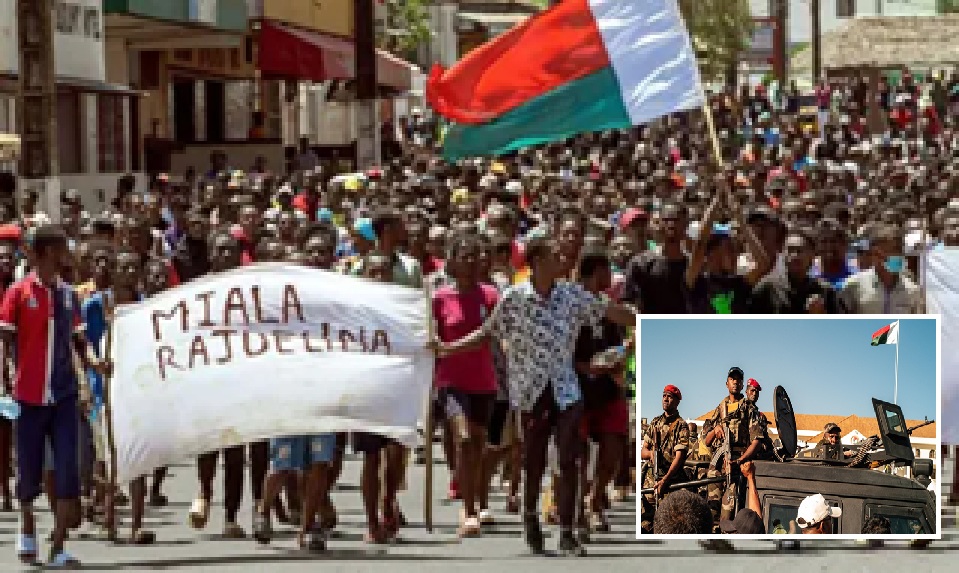
- An elite military unit, CAPSAT, has suspended and seized power in Madagascar amid widespread dissatisfaction with poverty, unemployment, and lack of basic facilities.
- The African Union, United Nations, European Union, and the United States have condemned Madagascar’s military takeover, while France has maintained a cautious diplomatic stance and continued its ties with the new regime.
- Colonel Michel Randrianirina, the new leader of Madagascar, has promised to hold elections within two years and transition toward civilian rule, as the people have expressed optimism about overcoming chronic issues like water shortages, power cuts, and poverty.
The political turmoil in Madagascar, which started with the so-called ‘Gen Z’ protests, has ended with the elite military unit, CAPSAT, suspending and seizing power in Madagascar. After widespread dissatisfaction with poverty, unemployment, and limited access to basic facilities, there has been mounting unrest and a chaotic situation among the people. Madagascar remains one of the poorest countries in the world, with 75% of its approximately 30 million people living below the poverty line, according to the World Bank. Only about one-third of the population has access to electricity, as reported by the International Monetary Fund. The growing discontent among citizens was already prevalent even before the protests, and many expressed support for regime change.
“This isn’t the end of the struggle; we are fighting for a change in the system, not just to replace one president with another,” said Olivia Rafetison, leader of the Movement Gen Z Collective. Olivia Rafetison is the young leader of the youth-movement coalition in Madagascar called Movement Gen Z Collective. Olivia actively led the protests in the capital Antananarivo, which began with demands for better water and electricity and escalated into a wider movement to overthrow the government.
The African Union’s Peace and Security Council has condemned Madagascar’s military takeover, declaring it unconstitutional. Similarly, the United Nations, the European Union, and the United States have condemned same way. Meanwhile, France, the former colonial power in Madagascar, has maintained a cautious diplomatic stance and avoided a clear position while continuing its ties with the new regime.
Historical Pattern of Coups & the Colonial Legacy
This is not the first time that Madagascar has faced such a situation. Since gaining independence, the country has experienced three coups in 1972, 1975, and 2009. The reasons were similar each time, involving economic stagnation, political instability, and military intervention. In recent years, countries like Gabon, Niger, Burkina Faso, and Sudan have also witnessed coups, reflecting a broader trend across Africa.
The answer to these recurring crises lies in the continent’s colonial history. Africa’s long period of colonisation left behind poverty, underdevelopment, and a lack of infrastructure and equitable resource distribution. Unlike countries such as India and others that managed to decolonise and rebuild a relatively stable system, many African nations continue to struggle with colonial economic structures, foreign-controlled banks and currencies, and a colonised mindset.
The influence of post-colonisation and westernisation can be seen when international organisations and Western powers remain unseen or react when a African countries change regime.
“Circulation of Elites” & Strategic Interests of the West
Democracy is a very abstract concept and difficult to achieve absolutely anywhere. Vilfredo Pareto’s concept of “circulation of elites” explains how power often changes hands among the ruling elite, rather than truly empowering the people. What it has led to, in many cases, is corruption, poverty, and lack of basic services, and limited access to essential facilities, especially in African nations where puppet regimes are often backed by external powers.
The United States and Western powers have promoted democracy to advance their own agendas, claiming that democracy leads to peace and stability, market growth, and good governance. However, at times, these same Western powers have supported coups against democratic governments and backed authoritarian regimes that serve their strategic interests. This dual approach reflects how democracy has often been used as a tool of geopolitical influence, rather than a genuine model for empowerment.
Will The Coup Lead to Real Change?
The key question is whether the regime changes supported by civilians in the hopes of betterment truly bring transformation. Is this change a genuine people-oriented and inclusive path toward better governance and fair distribution of resources, or merely a substitution of one elite group for another in power?
Colonel Michel Randrianirina, the new leader of Madagascar, has denied allegations of plotting to kill President Andry Rajoelina during the coup. He has also promised to hold elections within two years. The public has welcomed the news of change and hopes to overcome the chronic issues of water shortages, power cuts, and poverty. Colonel Randrianirina, in a statement, said: “Perhaps in time it will include senior civilian advisers. It is this committee that will carry out the work of the presidency. At the same time, after a few days, we will set up a civilian government.” The statement from Colonel Randrianirina expressed optimism for the nation, as his words are seen as a sign of his commitment to transitioning toward civilian rule and restoring stability in the country.
Garima Sharma is a Master’s student in International Relations at Jawaharlal Nehru University. Her interests include public policy, international governance, geopolitics, defence, and security. Views expressed are the author’s own.
